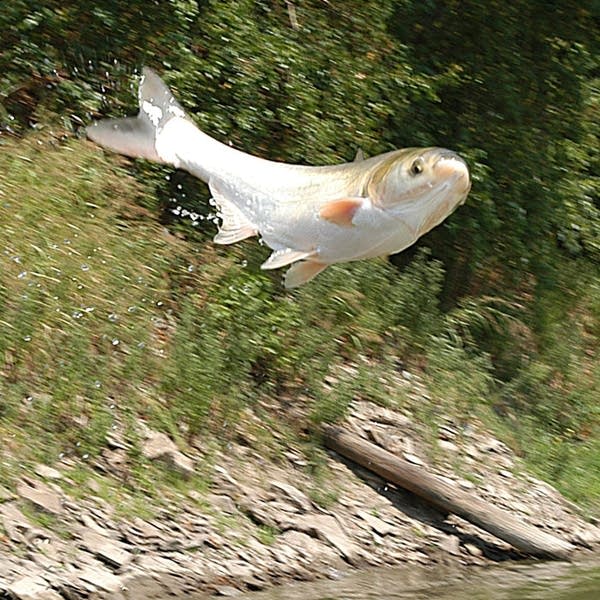White House promises $78.5M to try to halt Asian carp

The Obama administration said Monday it plans to spend $78.5 million to stop the spread of the Asian carp into more of the Great Lakes, including Lake Superior.
The newly-announced efforts are a sign the federal government is committed to help Great Lake states in their battle against the invasive species, which could disrupt the region's native wildlife and fishing industry.
Critics who have accused the White House of not doing enough reacted cautiously because few details of the plan are available.
The unveiled plans call for a multi-agency strategy to contain the carp in rivers just west of Chicago. Those waters are linked by canals to Lake Michigan and are infested with big head and silver carp, two species of the Asian carp. The fish, which can grow to massive size, threaten to invade all of the Great Lakes if they reach Lake Michigan. Some carp DNA has been identified in the lake already.
Create a More Connected Minnesota
MPR News is your trusted resource for the news you need. With your support, MPR News brings accessible, courageous journalism and authentic conversation to everyone - free of paywalls and barriers. Your gift makes a difference.
After meeting with administration officials, Wisconsin Gov. Jim Doyle says he's convinced the White House is taking on the issue in a significant way.
"With cabinet secretaries and this level of attention, and this commitment of resources, I have no doubt they are very much focused and taking this very very seriously," he said.
THE PLAN
The $78.5 million will go toward projects including construction of a third electric fish barrier, to be in place by this fall; and infrastructure improvements to prevent carp from spilling into canals that reach Lake Michigan during flood events.
The administration promises aggressive sampling and DNA testing to find and kill the carp. The governors, with the exception of Illinois Gov. Pat Quinn, have been pushing for closure of shipping canals that could provide connections between infested waters and Lake Michigan.
Shipping interests near Obama's hometown of Chicago strenuously objected to that plan as too costly. The White House didn't agree to close the canals, but said it will focus attention on the canals.
Some blame Obama's close Chicago ties for a reluctance to close the infested waterways, but Nancy Sutley, Chair of the White House Council on Environmental Quality, says that's not the case.
"We are taking actions based on the science and what the science tells us," she said. "This is clearly a priority for certainly for the midwestern and the Great Lakes states, but it's also a priority for the federal government and the Obama Administration."
Currently, the locks open when ever a boat or barge arrives for passage. Jo Ellen Darcy, Assistant Secretary of the Army, Civil Works, says enacting a schedule for the locks is one alternative.
"We're looking at...a schedule for when those locks would be opened and when they would be closed," Darcy said.
And when opened, fish in the locks would be killed, with fish poisons or electric shock.
WAITING FOR DETAILS
Andy Buchsbaum, Regional Executive Director for the National Wildlife Federal, says the plan sounds like moves in the right direction, but he won't know until the details are released, which is probably several weeks down the road.
"On the plus side, it includes all of the important emergency actions," he said. "But, on the minus side it leaves details of that plan up in the air."
He says timing and application of things like poison will be important.
"Those details are supposed to come in two or three weeks, and we'll all be waiting until then, if, in fact, it's not already too late by then," he said.
Governors of Michigan and Wisconsin met with the officials in the White House. The Illinois Governor joined by phone. Minnesota Governor Tim Pawlenty had a prior commitment.
Tuedsay, the House Transportation and Infrastructure Committee, chaired by Jim Oberstar, DFL-Minn., will take up the issue of asian carp.
